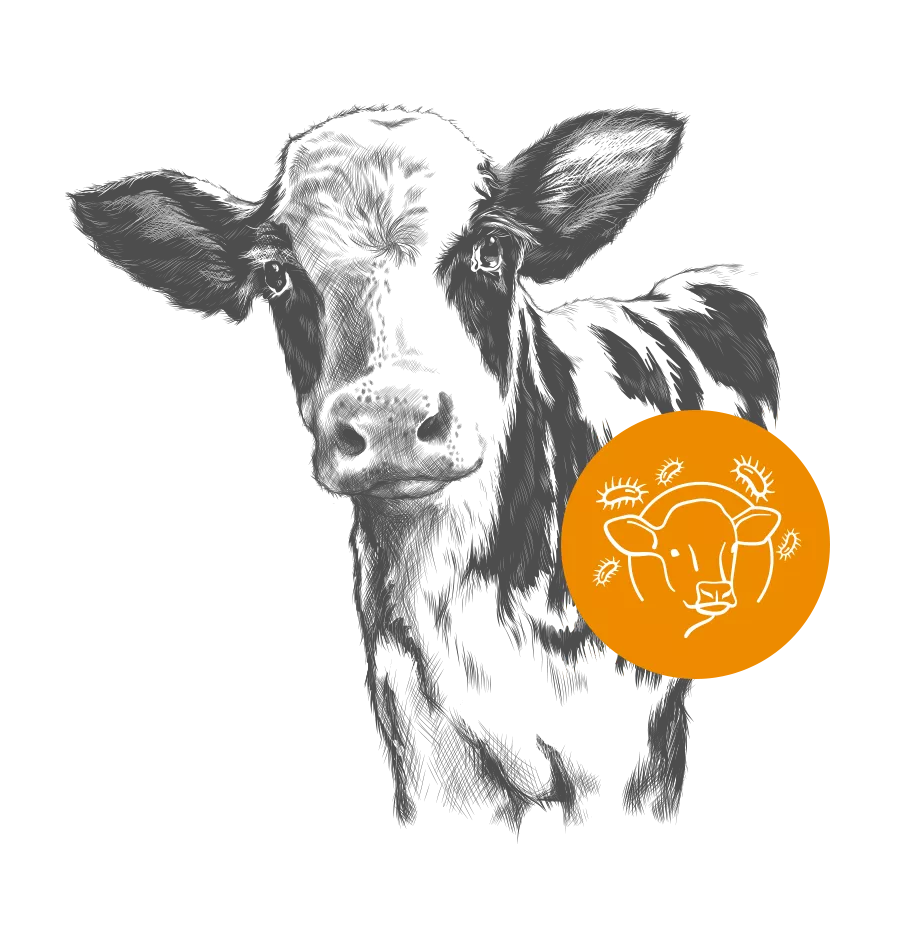Cryptosporidiosis in calves
What is the problem?
Diarrhea in calves is still a very important problem for the modern dairy industry as it is responsible for 57% of young animal losses. Furthermore, diarrhea causes reduced growth performance in calves, which can have long-term effects lasting until the first lactations.
In neonatal calves, there are four main pathogens to cause diarrhea: E. coli, rotavirus, coronavirus and Cryptosporidia. Mixed infections with several of these pathogens are common. In recent years, cryptosporidiosis has gained importance and is now the most challenging form of diarrhea in newborn calves. There is no vaccination available and prevention of Cryptosporidia has shown to be difficult.
What are Cryptosporidia?
Cryptosporidia are unicellular parasites that infect the cells of the gastrointestinal tract. There are many species of Cryptosporidia that can infect many kinds of animals. In calves, Cryptosporidium parvum is by far the most significant species.
C. parvum is a non-host-specific pathogen, which means that, apart from calves, it can also infect other animals, including humans. In humans, an infection with Cryptosporidia is usually much less severe than in calves and rarely lasts longer than a week. Nevertheless, this should be considered when treating cryptosporidiosis in calves.
What happens in the calf?
An infection with Cryptosporidia starts with the ingestion of so-called oocysts. Oocysts can be compared to an egg that is extremely resistant to environmental impacts and can survive for up to one year in the calf’s environment. When these oocysts enter the calf’s gastrointestinal tract via food or bedding, they hatch and nest in the intestinal mucosa. Once incorporated by the intestinal cells, Cryptosporidia start to multiply and to infect further cells. After several stages of development, the Cryptosporidia form new oocysts that are excreted to the environment to infect further animals.
How can Cryptosporidiosis be prevented?
Cryptosporidiosis is a widespread problem in newborn calves that mainly affects calves with a poor immune system. Therefore, good colostrum management is essential. In general, this means, 2 – 3 liters from the 1st milking should be fed within the first 2 hours after birth. Within the first 12 hours after birth, another 2 liters should be given. The colostrum should contain at least 50 g IgG/liter, which can easily be checked using a colostrometer or refractometer.
The second pillar of Cryptosporidia prevention is hygiene in the calving pen and calf hut. The oocysts can survive in the environment for long periods of time and only a small number of occysts is necessary to cause infection. Therefeore, if possible, the calving pen should be mucked out after each calving. Furthermore, the practice of using the calving pen as a sick box is to be rejected urgently. Both measures considerably reduce the pathogen pressure on the calf. Calf huts should also be kept clean and dry. Before the calf huts are re-occupied, they should be thoroughly cleaned and disinfected. When disinfecting, care must be taken to the fact that Cryptosporidia are resistant to many disinfectants. Disinfectants that are suitable for destroying Cryptosporidia and other unicellular parasites usually state this.
Furthermore, feed additives that stabilize gut health and improve gut integrity can help to prevent cryptosporidiosis, as it requires much higher numbers of Cryptosporidia to establish an infection in a healthy gut compared to a gut with pre-existing disorders. If a calf has fallen sick, it is most important to keep the milk uptake high, as water and energy loss from the gut must be compensated to reduce the impact of diarrhea. Certain feed additives containing secondary plant metabolites have proven to improve milk intake in calves, even during diarrhea.

About the author
Dr. Oguz Calisici studied veterinary medicine in Germany and Turkey. After completing his doctoral Thesis at the University of Hannover, he continued working at the university in the areas of biotechnology and artificial insemination. After working as a practical vet in Germany, Oguz was the managing director of a large dairy company in Turkey. At Phytobiotics, Oguz has taken over the product management of Immune Milk.

